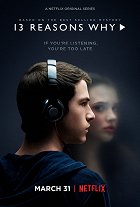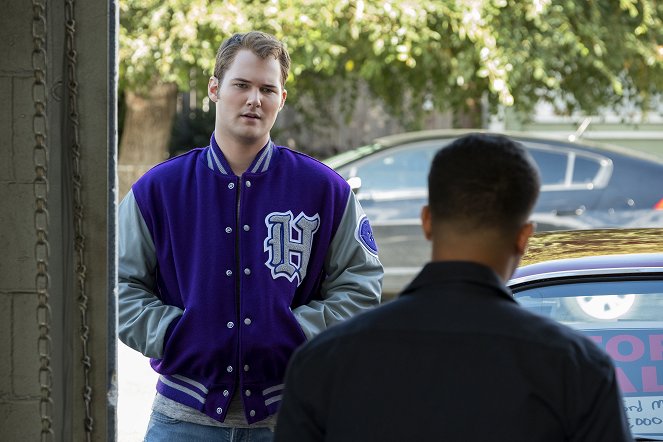Creators:
Brian YorkeyComposer:
Brendan AngelidesCast:
Dylan Minnette, Katherine Langford, Christian Navarro, Alisha Boe, Brandon Flynn, Justin Prentice, Miles Heizer, Ross Butler, Devin Druid, Amy Hargreaves (more)VOD (1)
Seasons(4) / Episodes(49)
Videos (8)
Reviews (6)
A painful high school romance, paced by a precise soundtrack, perfectly mapping the journey to suicide in ways we often downplay or (un)intentionally overlook. This makes it all the more frustrating that the attempt at an almost mysterious atmosphere is shattered by the fact that the reason why Clay doesn't listen to all 13 recordings right away, and quite pointlessly puts it off, is simply not rationally defensible in any way. This means that even the ending, which wants to let the storyline of all-encompassing hypocrisy stand out, can't fully live up to it; the à propos Dylan Minnette is an autistic actor, utterly pointlessly harassed by the show's creators; by contrast, Katherine Langford will one day be a big star. 4 ½.
()
An incredibly powerful story full of pain and helplessness, getting darker, more painful and increasingly emotionally fraught with each episode, to such an extent that I only managed to watch the last episodes by sheer force of will. Personally, I really like intelligent high school series about the real power of love and friendship, as well as the problems brought about by adolescence. But for me personally, 13 Reasons Why is the first of its kind that took all that heartache and soul-ache to such an extreme level, shattering me to pieces and making me think all kinds of thoughts. More such series, please, because (especially, but not just in America) it represents a truly mind-blowing testimony of a generation. S01: 10/10. S02: 8/10. The third season is a detective story which gets more thrilling with each new episode, so in the last one you are in anticipation of a surprising unraveling in the style of “Murder on the Orient Express”. Instead, it's a huge disappointment - the ending of the detective story line is something so insanely illogical, unrealistic, and badly written, that I really struggle to keep myself from ignoring all the previous episodes and giving the whole season a much lower rating. Good acting performances, but I can’t help thinking they should have called it quits after the excellent first season. S03: 6/10.
()
Days after watching this series, I still think about the story, and when I remember it, I am overwhelmed with a heavy feeling of helplessness and sadness. How just one single act or two words could have changed something, reversed something. If only people would treat each other better and show their feelings – I guess I'm naive :) I also think it didn't have to end the way it did, but anyone who says that nothing that bad actually happened and that there was no reason to, either never was a victim of bullying themselves, never was mocked, or just isn't empathetic enough. After all, teenagers are so vulnerable. The emotions and the sheer gravity of the stories we hear from the tapes intensify with each episode. I enjoyed this series and it moved me a lot. The credit for this goes to the story itself, of course, but mainly to the acting and the first-class soundtrack. I was pleasantly surprised by Dylan Minnette, he always reminded me of his fellow actor Logan Lerman, who I always thought was better, but I have to say that Dylan as Clay won me over. It may seem illogical to some that he didn't listen to the tapes in one night, I agree with that too, but I can imagine myself not getting into it for fear of what I would hear about myself. Katherine Langford as Hannah is another revelation for me, I believed her every tear and cheered for her so much, which makes it all the more heartbreaking. A truly fabulous series that, if it weren't so sad, I'd watch again.
()
A tough thing to review. It’s a pretty imaginatively told story (though the screenwriting leaves plenty to be desired) that in the 10th and 11th episodes, and especially in the 12th and 13th reaches a strong climax. But why the hell did the real drama have to start so late? Two thirds of the series are about a whining, over-sensitive cow trying to convince the over-sensitive audience that she is really to blame for her problems. Given the climax in the last episodes, I think it’s terrible that the series is built in such way that anyone watching it can get the idea that “it’s her fault”. And it is really like that, because until those last few episodes, they address the type of terrible pettiness that, in one way or another (and much worse), most people had to face in secondary school. As a result, I soon began hating all the characters, and actually poor Hannah most of all. Her teenage wisdom voiceover is annoying, and so is the permanently brooding expression of the only righteous person, Mr. Clay. The last episodes improve the impression, but the fact remains that I got to them only through willpower. The pettiness piles up and piles up, to the point that it is no longer pettiness, and all that remains is antipathy towards the characters. By the way, does anyone really believe that, in 2017, someone feeling so truly downtrodden as to kill themselves would record 13 cassettes before the act, where they would speak about their suffering, almost without emotion and with a “narrative perspective”? And to perform graceful narrative pirouettes like “I’ll leave this part of the story for later”? This series portrays suicide as a romantic gesture, and I believe that’s very dangerous. If this had come up ten years ago, when the Emo style was all the rage, I think we would’ve had a few more dead teenagers.
()
Try to imagine Beverly Hills 90210 as flawlessly cast and brilliantly paced film noir. 13 Reasons Why has the most in common with the work of Gregg Araki (not only because of the excellent soundtrack that provides commentary on what the protagonists are experiencing), who directed two episodes. The characters include most of the types known from high-school movies since at least Grease (which Tony seems to have come straight out of with his hairstyle and outfit), but the series portrays them with unusual sincerity and perceptiveness, handling them in a rather unpredictable way and viewing their decisions in broader contexts (social and economic), so that in the case of most of them, we better understand why they behave the way they do. ___ The gradual untangling of the tightly woven web of social ties runs in parallel with the revealing of who all contributed to Hannah's suicide, thus bringing about the revelation that no one (including the outsider protagonist or the adults) was actually completely blameless, even though the wrongdoing consisted only in a lack of empathy. The decision to build the whodunit narrative on a melodramatic, slightly emo foundation works also thanks to the fact that Clay gets caught up in the narrative and, during the “investigation”, experiences something similar to what Hannah endured. He essentially becomes her avatar, who does what she can no longer do. On the stylistic level, the interconnectedness of the past and present is reflected in the seamless transitions between “then” and “now” – for example, merely by changing the colour tone (cool colours for the present, warm for the past) – and the graphic continuity of two adjacent shots that are actually separated by several weeks/months (the presence/absence of the scar on Clay’s forehead serves well for orientation in the timeline). The suspenseful nature of the narrative is also aided by the varying degrees of the individual character’s awareness – whereas others have already played all of the tapes and sometimes refer to something that will be explained only several episodes later, Clay remains in the dark (and we along with him). ___ To some viewers, the series, which focuses primarily on themes such as rape, sexism, depression, alcoholism and bullying, may seem exceedingly dark, if not exploitative, but in light of the fact that its creators strive for realism mainly in the development of characters rather than in depicting a fictional world (which is deliberately somewhat of a model) and the story is for the most part told and its direction determined by the main victim of most of the physical and psychological abuse, who finds herself pushed beyond the limits of her possibilities, the chosen tone and naturalism in the depiction of said abuse makes sense (regardless of whether we consider Hannah, in the words of one of the characters, to be a “drama queen”). ___ One more introductory episode in which we would have seen Hannah through the eyes of her classmates would have been appreciated, as it would have later been more apparent that their distorted view of her was due to their ignorance of her circumstances. The suggestions that Hannah was an unreliable narrator and her version of the stories was actually only “one side of the tape” could also have been elaborated upon. Of course, there would have been more to it (the occasionally somewhat cheesy dialogue, Hannah as the embodiment of boys’ fantasies of an unusual, sarcastic and sexy girl), but it is still a stylistically mature, narratively remarkable and, in its comprehension of the issue of teen angst, adult series, and it will take me a while to recover from its devastating finale (by which I don't mean the last few minutes, but the final three episodes).
()
(less)
(more)



Ads